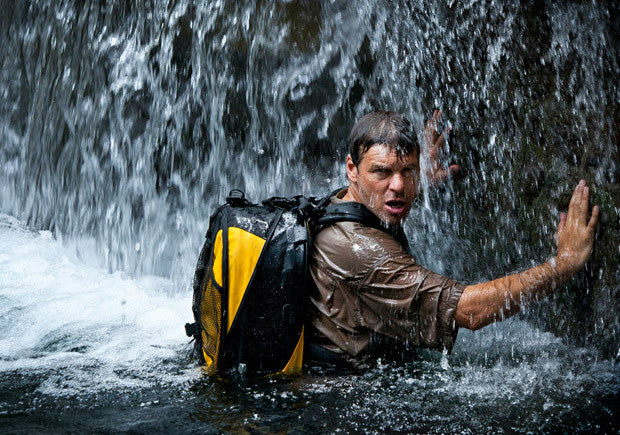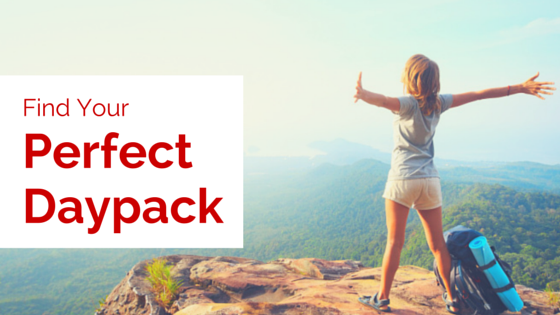What Is A Travel Daypack?
A travel daypack is a smaller secondary bag that you travel with. This is in addition to your main bag or suitcase.

Why You Need A Travel Daypack?
The main reason why it is important to bring a travel daypack is so you have a portable option to hold your stuff while you are away from your main backpack. That being said, there are 2 very specific use cases where I have found having a travel daypack is essential:
1. To Hold Stuff While Sightseeing
As stated above, you obviously aren't going to bring your main backpack or suitcase out with you while you are exploring a city or doing a physical activity like hiking. This is where daypacks are extremely useful because they can hold your wallet, keys, camera, water bottle, sunscreen, guidebook, light jacket, etc.
2. To Hold Stuff While In Transit
It wasn't until I was backpacking around Southeast Asia for 3 months that I realized how important daypacks are for transiting (bus, boat, plane, train).
For example on long distance buses in Asia, they make you check your main bag under the bus. So if you want to bring any items from your main bag onto the bus like food, water, laptop, headphones, books, extra clothes, etc, you either need a separate bag to put them in or you have to carry them onto the bus in your hands. The bus seats have no storage so without an additional bag, the chances of losing things are extremely high.
Thankfully in Asia, I always had a daypack so I could just throw all my miscellaneous items into it without a problem. The same general idea also holds true while flying.
For my main bag, I use a Tortuga Carry On Backpack but if I am stuck in the middle or window seat in Economy, it is a pain to get up, open the overhead bin, take my Tortuga bag down to get my laptop, books, headphones, etc.
With a daypack, I just keep all the small things that I know I will need for the flight in my daypack and then slide it under the seat in front of me so it is easily accessible.
What To Look For In A Travel Daypack
Not all daypacks are created equally, so here is a quick rundown of things to look for when you are a picking a daypack. Some features might not apply to you but from traveling extensively around the world, this is what I have found to be the most important features.
1. Foldable or Packable
For me the most important thing when picking a daypack is finding one that is foldable so when you aren't using it, you can simply fold it down and pack it into your main bag.

Unfortunately many people think that daypack = backpack so they just bring their North Face backpack from college.

DON'T DO THAT! Not only are those types of bags extremely heavy but they can't fold down so you will look like the below photo and carry unnecessary weight around with you.

Not fun! Take my advice and get a packable daypack!
2. Lots Of Pockets
The more pockets the better in my opinion because it helps keep all your stuff organized. Some people love the Sea to Summit Ultra-Sil Day Pack because it is compact but for me the fact that it lacks any pockets outside of the main central compartment is a complete deal breaker.

If you dump all your stuff into a central compartment and something leaks (water bottle) or explodes (sunscreen), everything is basically ruined. Trust me because this has happened to me before! With pockets, you can keep your electronics in one spot, your keys in another, water bottle in another, your laptop in another, etc.
Not only is it easier to find everything but in the event of a leak or accident, hopefully the extra buffer space should keep your items safe.
3. Laptop Sleeve
If you don't travel with a laptop or iPad, then this feature probably isn't important to you but if you are a digital nomad, then this feature is a must. I like having a separate laptop sleeve because it keeps my computer safe from all my junk in the central compartment and is much easier to access.

4. Water Proof You never know what the elements are going to be like when traveling, so it is always good to get a daypack that is waterproof or at least water resistant because if it starts to rain, you don't want your guidebook or camera to get soaked (again this has happened to me).

5. Security
Pickpocketing is very common in most large cities, so it is important to keep that in mind when choosing a daypack. While there are daypacks that are designed to be anti-pickpocket, they lack all of the above features and are a bit overkill.
If someone is really determined to steal your bag, unfortunately there is nothing you can do about it. I have found that it is much cheaper and smarter to simply buy a daypack where access to the main compartment is protected from the outside (ie. covered by drawstring or buckles, etc). If your bag looks remotely complicated to break into, more than likely thieves will move on to easier targets.
6. Size
Your travel daypack should be large enough to hold all your stuff but not so big that it is larger than your main pack. The current daypack I use right now is 35L and I'd say anything bigger than 35L is too big. The ideal range is somewhere between 20L - 35L.
7. Comfort
The lighter the daypack, the less comfortable it will probably be because every additional feature adds on weight. Therefore I wouldn't recommend buying a daypack based only on its weight. My previous daypack was an ultralight daypack and didn't have padded shoulder straps. It wasn't until I bought my current daypack that I realized what a difference having padded shoulder straps makes.

Remember that you will be wearing your daypack for hours at a time depending on what activity you are using it for, so make sure your pack is comfortable.
8. Price
For many people, price is the single most important thing they look at when buying a daypack. While I would avoid only using price to determine what you are going to buy, from my experience over the last few years buying and using daypacks in the field, you can get a top quality daypack for less than $50. Anything above $50 is probably either overpriced or has features that you don't really need.
Final Words
For me, traveling with a daypack is an absolute necessity. Not only are daypacks immensely useful while out sightseeing but are also lifesavers while in transit.
If you don't have a daypack yet, I highly suggest getting one. We have some great packable daypacks available in the TravelMore Store.
These are the exact daypacks we use when traveling. If you have any recommendations for daypacks or other features that you think are important when choosing a daypack, please leave them in the comments below.
-Parag

